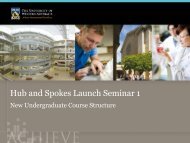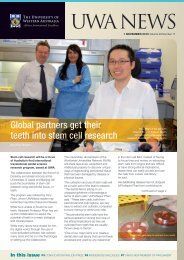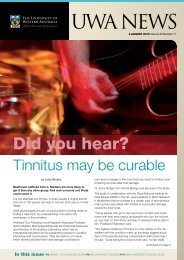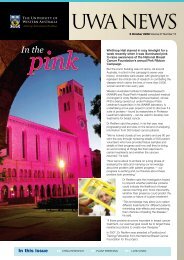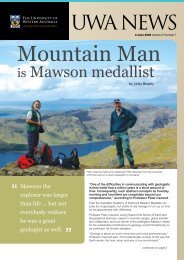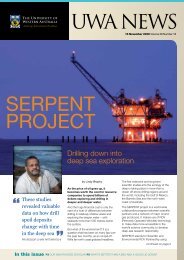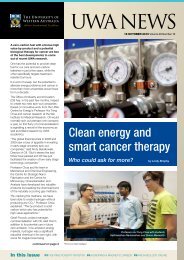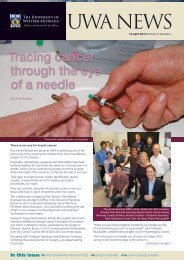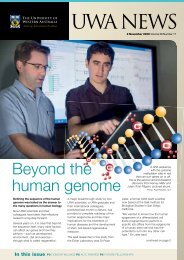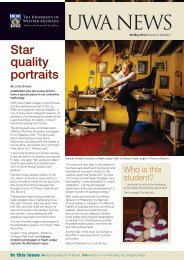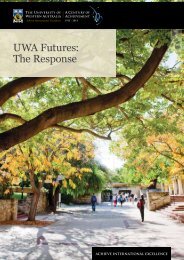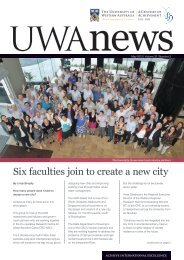Issue 13. 6 September 2010.pdf [PDF File, 1.7 MB] - UWA Staff - The ...
Issue 13. 6 September 2010.pdf [PDF File, 1.7 MB] - UWA Staff - The ...
Issue 13. 6 September 2010.pdf [PDF File, 1.7 MB] - UWA Staff - The ...
Create successful ePaper yourself
Turn your PDF publications into a flip-book with our unique Google optimized e-Paper software.
Chief investigators have<br />
already written extensively<br />
on emotions<br />
Emotions have shaped our lives<br />
continued from page 1<br />
This is where researchers can start to examine continuities and discontinuities between modern<br />
and pre-modern emotions and emotional responses.<br />
“Emotions are fundamental to individual and social well-being, and understanding their history,<br />
origins and changes over time and how they vary between individuals and mass emotions has<br />
a lot to tell us about who we are today and how we react to social, political, environmental and<br />
other modern day challenges,” said Winthrop Professor Susan Broomhall, deputy director of<br />
the new Centre, which will start work at the beginning of next year.<br />
<strong>The</strong> Centre’s director, Winthrop Professor Philippa Maddern, is in Europe, negotiating with<br />
partners and collaborators, one of which is the Globe <strong>The</strong>atre in London.<br />
“Our research activities will be designed with practical knowledge transfer in mind, working with<br />
creative arts industries and we hope that the Globe will become another of our partners,”<br />
Professor Broomhall said.<br />
Other industry partners are the National Gallery of Victoria (NGV), ABC TV and WA Opera.<br />
<strong>The</strong> Centre’s research will be conducted and presented through three major performance/<br />
exhibition events: a Shakespearean drama production at Australia’s only replica Jacobean<br />
theatre, <strong>UWA</strong>’s New Fortune; a Baroque opera in 2015 (partnered by WA Opera); and a major<br />
exhibition of Australia’s relevant pre-modern art holdings in 2016-17 (partnered by the NGV).<br />
Part of <strong>UWA</strong>’s contribution to the Centre will be the refurbishment of the New Fortune <strong>The</strong>atre.<br />
“<strong>The</strong> Centre will have practitioners-in-residence and vice-versa,” said Professor Broomhall.<br />
“Our researchers will go out into industry and work with them.”<br />
Allied with the practical approach, the Centre will pioneer new methods of interdisciplinary<br />
research called collaboratories: innovative communication events at which, unlike usual<br />
symposia, research will be produced – not just reported – through intensive exchanges of<br />
disciplinary approaches, theories, methods and findings.<br />
Four main research programs will form the framework of the Centre’s work.<br />
Meanings, a program to determine how emotions have been identified, described and<br />
expressed through intellectual, literary and social practices in Europe 1100 to 1800, will be led<br />
by <strong>UWA</strong>’s Professor Bob White, an internationally renowned scholar of Shakespeare and early<br />
modern English literature and drama.<br />
Change will be led by Professor David Lemmings from the University of Adelaide. <strong>The</strong> program<br />
will investigate the drivers of emotional changes in society and the power of collective emotions<br />
to produce major cultural, social, political and economic change.<br />
<strong>UWA</strong>’s Professor Jane Davidson, an outstanding creative practitioner and musicologist, will lead<br />
the Performance program, to interrogate how emotions were performed and expressed in<br />
pre-modern times. Her group will use reflective performances to enhance the understanding of<br />
how pre-modern performers and artists constructed and expressed emotion.<br />
<strong>The</strong> fourth and final program leader is Professor Stephanie Trigg from the University of<br />
Melbourne, whose program, Shaping the Modern, will explore Europe’s legacy for emotional<br />
understandings and practices in Australia today.<br />
Professor Yasmin Haskell, <strong>UWA</strong>’s Cassamarca Foundation Chair in Latin Humanism, is one of<br />
four free-floating chief investigators, the others based at the universities of Melbourne, Sydney<br />
and Queensland.<br />
International investigators are joining the Centre from Sweden, Germany, Switzerland, and<br />
London and Newcastle in the UK.<br />
Professor Haskell said the Centre’s research would include addressing mental health problems,<br />
bringing in practitioners and researchers from the disciplines of psychology (including <strong>UWA</strong>’s<br />
Professor Colin MacLeod, Director of the new Elizabeth Rutherford Memorial Centre for the<br />
Advancement of Research into Emotion), psychiatry and population health.<br />
Renowned neuroscientist, Professor German Berrios (Cambridge) is only<br />
one of several stellar international figures excited to be joining the<br />
Advisory Board of the Centre.<br />
“It’s wonderful to get support from the whole university. One of our<br />
greatest champions has been Pro Vice-Chancellor Professor Alistar<br />
Robertson (an agricultural scientist), who has consistently argued<br />
for the importance of humanities research and encouraged us to<br />
persevere with our ideas,” Professor Haskell said.<br />
2<br />
<strong>UWA</strong> NEWS 6 <strong>September</strong> 2010<br />
<strong>The</strong> University of Western Australia


![Issue 13. 6 September 2010.pdf [PDF File, 1.7 MB] - UWA Staff - The ...](https://img.yumpu.com/26619782/2/500x640/issue-13-6-september-2010pdf-pdf-file-17-mb-uwa-staff-the-.jpg)
